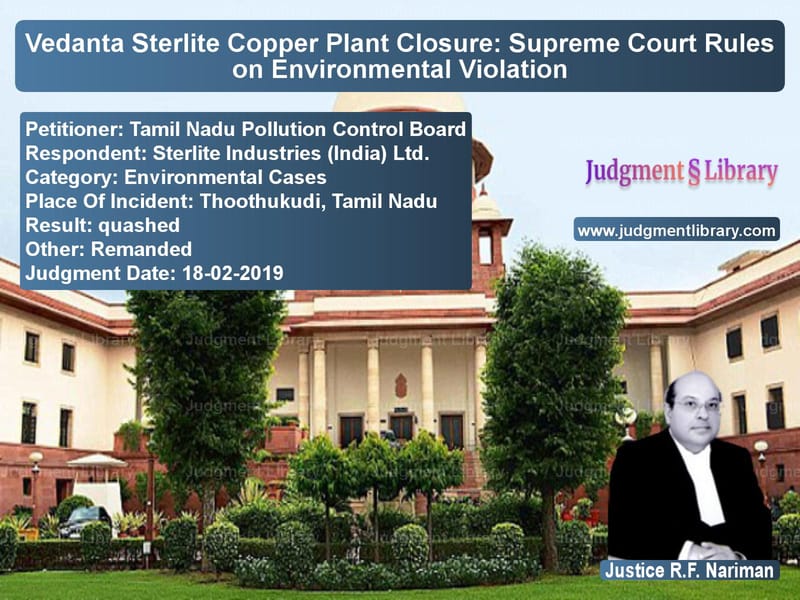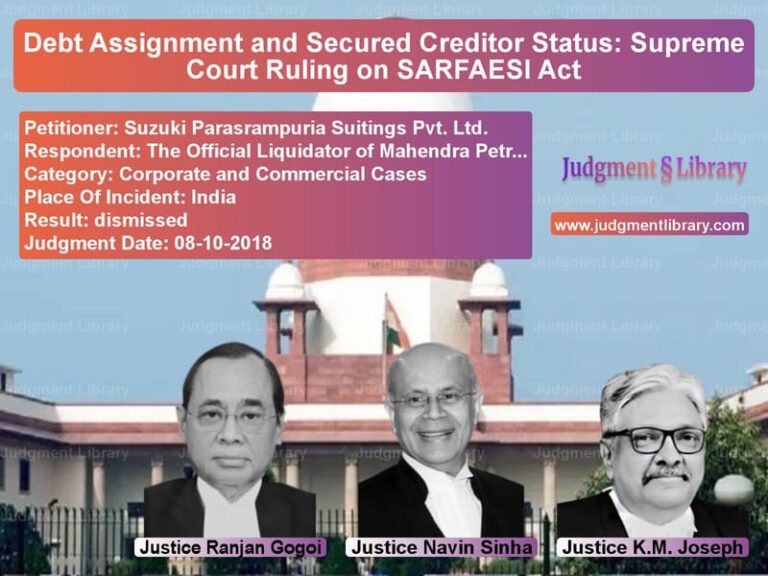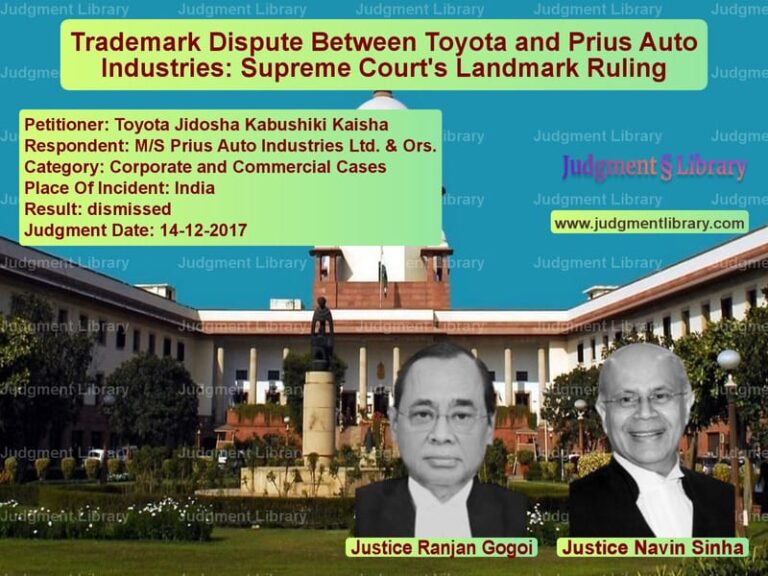Vedanta Sterlite Copper Plant Closure: Supreme Court Rules on Environmental Violation
The Supreme Court of India recently delivered a landmark judgment in the case of Tamil Nadu Pollution Control Board vs. Sterlite Industries (India) Ltd., which involved the closure of the Sterlite Copper Plant in Thoothukudi, Tamil Nadu. The case raised important questions about industrial pollution, environmental compliance, and the role of regulatory authorities in safeguarding public health.
Background of the Case
Sterlite Industries (now Vedanta Ltd.) operated a copper smelter plant at the SIPCOT Industrial Complex, Thoothukudi. The plant was granted environmental clearance by the Ministry of Environment and Forests (MoEF) in 1995 and began operations in 1997. Over the years, several allegations surfaced regarding environmental pollution, including excessive emissions of sulfur dioxide, groundwater contamination, and non-compliance with safety norms.
On March 23, 2013, local residents complained of severe health issues, including throat infections, respiratory problems, and nausea, allegedly caused by emissions from the plant. In response, the Tamil Nadu Pollution Control Board (TNPCB) conducted an inspection and issued a show-cause notice on March 24, 2013. A closure order was subsequently issued on March 29, 2013, under Section 31A of the Air (Prevention and Control of Pollution) Act, 1981.
The matter was challenged before the National Green Tribunal (NGT), which stayed the closure order and allowed the plant to resume operations. The NGT’s decision was appealed before the Supreme Court, which took up the case.
Legal Issues and Arguments
The primary legal issues in the case were:
- Whether the TNPCB’s closure order was justified based on environmental violations.
- The maintainability of the appeal before the NGT.
- Whether due process was followed before issuing the closure order.
- The role of the Tamil Nadu government in permanently closing the plant.
Arguments by the Tamil Nadu Pollution Control Board (TNPCB)
The TNPCB argued:
- Sterlite Industries was a repeat offender that violated environmental norms.
- The plant’s sulfur dioxide emissions exceeded permissible limits, affecting public health.
- Groundwater contamination and hazardous waste mismanagement posed serious environmental threats.
- The closure order was justified under Section 31A of the Air Act and Section 33A of the Water (Prevention and Control of Pollution) Act, 1974.
- The NGT lacked jurisdiction to entertain the appeal.
Arguments by Sterlite Industries
Sterlite Industries countered:
- The closure order was arbitrary and issued without giving the company a chance to rectify issues.
- The NGT had jurisdiction to review the matter.
- The company had obtained necessary environmental clearances and was compliant with pollution control norms.
- The allegations of pollution were exaggerated and politically motivated.
Supreme Court’s Ruling
The Supreme Court ruled on two key aspects: jurisdiction and the merits of the closure order.
1. Jurisdiction of the NGT
The TNPCB contended that the appeal before the NGT was not maintainable because the closure order was passed under Section 31A of the Air Act and Section 33A of the Water Act, which do not provide a direct appeal to the NGT. The Supreme Court held:
“An appeal is a creature of statute, and no tribunal can assume jurisdiction beyond what is prescribed by law.”
It ruled that the NGT lacked jurisdiction to entertain the appeal against TNPCB’s closure order, as the correct route would have been an appeal before the appellate authority under the Air and Water Acts.
2. Validity of the Closure Order
The Supreme Court examined whether TNPCB’s closure order was justified based on environmental violations. The Court observed:
“The right to a clean environment is a fundamental right under Article 21 of the Constitution. Industrial development cannot come at the cost of public health and environmental degradation.”
However, it also noted procedural lapses by TNPCB:
- The closure order was issued without granting Sterlite an opportunity to be heard.
- No independent expert assessment was conducted before issuing the order.
- The order relied on allegations rather than concrete scientific findings.
While the Court acknowledged pollution concerns, it emphasized that due process must be followed in closing an industrial unit.
Final Judgment
- The Supreme Court quashed the NGT’s order allowing the plant to operate.
- It ruled that TNPCB’s closure order was legally unsustainable due to procedural flaws.
- The Court granted Sterlite Industries the right to file a fresh appeal before the appellate authority.
- Pending appeals and writ petitions related to the case were directed to be heard expeditiously.
Impact and Significance of the Judgment
- Clarification on NGT’s Jurisdiction: The judgment sets a precedent on the appellate jurisdiction of environmental tribunals.
- Reinforcement of Due Process: The ruling highlights that regulatory bodies must follow due process before closing industrial units.
- Balancing Environmental Protection and Industrial Growth: The judgment recognizes the need to balance industrial development with environmental conservation.
Conclusion
The Supreme Court’s ruling in Tamil Nadu Pollution Control Board vs. Sterlite Industries is a landmark decision that underscores the importance of procedural fairness in environmental regulation. While affirming the need for stringent environmental protection, the judgment ensures that industries are given a fair opportunity to defend themselves against closure orders. The case will serve as a guiding precedent in future environmental disputes involving industrial pollution.
Petitioner Name: Tamil Nadu Pollution Control Board.Respondent Name: Sterlite Industries (India) Ltd..Judgment By: Justice R.F. Nariman.Place Of Incident: Thoothukudi, Tamil Nadu.Judgment Date: 18-02-2019.
Don’t miss out on the full details! Download the complete judgment in PDF format below and gain valuable insights instantly!
Download Judgment: Tamil Nadu Pollution vs Sterlite Industries Supreme Court of India Judgment Dated 18-02-2019.pdf
Direct Downlaod Judgment: Direct downlaod this Judgment
See all petitions in Environmental Cases
See all petitions in Judgment by Rohinton Fali Nariman
See all petitions in Quashed
See all petitions in Remanded
See all petitions in supreme court of India judgments February 2019
See all petitions in 2019 judgments
See all posts in Environmental Cases Category
See all allowed petitions in Environmental Cases Category
See all Dismissed petitions in Environmental Cases Category
See all partially allowed petitions in Environmental Cases Category







